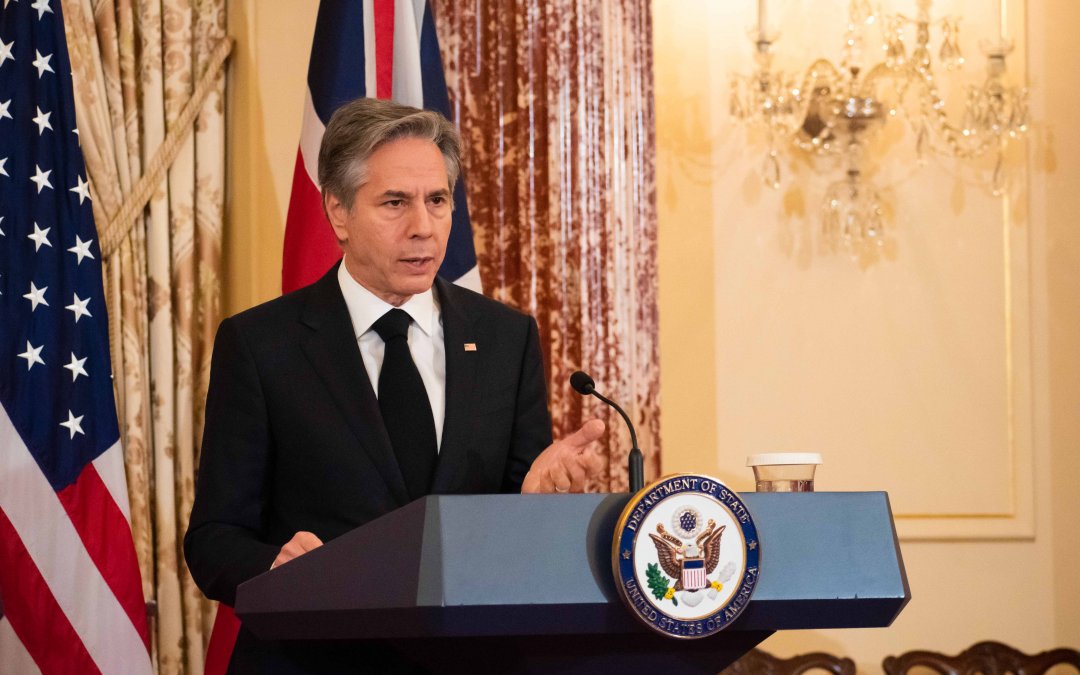WASHINGTON – In a small room on the margins of a summit for world leaders in fall 2021, Secretary of State Antony Blinken took aside Ukrainian President Volodymyr Zelensky and informed him of U.S. intelligence that Russia was planning to invade Ukraine.
“He took it very solidly, very seriously,” said Blinken, recalling the “surreal” experience in a conversation on Thursday with Jeffrey Goldberg, editor-in-chief of The Atlantic. “Ever since, he has become an extraordinary figure on the world stage – all to the benefit of his country.”
On the eve of the one-year anniversary of the start of the war, Blinken praised the fight of Zelensky and his people, reaffirmed the United States’ commitment to defending Ukraine and downplayed concerns about Russian nuclear escalation.
Blinken characterized Ukraine’s stronger-than-expected opposition over the last year as a “victory,” which is in line with comments from President Joe Biden during his 72-hour visit to Poland and Ukraine earlier this week.
“One year ago, the world was bracing for the fall of Kyiv. Well, I’ve just come from a visit to Kyiv and I can report, Kyiv stands strong,” Biden said on Tuesday in Warsaw. “Kyiv stands proud, it stands tall and most importantly, it stands free.”
The secretary on Thursday recalled that Russia was expected to take the Ukrainian capital in a matter of days after it launched its full-scale invasion. But because of preparations made by Zelensky in the months leading up to the war, Blinken said Russian President Vladimir Putin failed in his mission to “erase Ukraine from the map.”
“We have been in awe of (the Ukrainians) courage, their resilience, their strength and their effectiveness. It has, in some ways, gone beyond what we might have anticipated,” Blinken said.
Bliken said the U.S. will work with Ukraine to end the fighting in a “just and durable” manner that would make it “much less likely, if not impossible” for Russia to invade again.
When pressed by Goldberg on whether he would still consider it a victory if Russia held on to any parts of Ukraine, including Crimea and other parts Russia seized in 2014, Blinken said it’s important to ensure Ukraine remains an independent, sovereign nation, but that it’s “up to the Ukrainians to decide” the terms of negotiations relating to the country’s borders.
While Biden has vowed to stand with Ukraine for “as long as it takes,” some Republican members of Congress have attacked the administration for its financial support of the war effort.
The U.S. has already contributed nearly $50 billion in aid to Ukraine since the start of the war, according to the Council on Foreign Relations. Biden pledged another half-billion dollars in security assistance during his unannounced visit to Kyiv on Monday.
Some 48% of Americans said they were in favor of providing weapons to Ukraine, according to an Associated Press-NORC Center for Public Affairs Research poll released last week. In May, 60% of U.S. adults said they were in favor of sending weapons.
One fear expressed by anti-war activists is that continued U.S. involvement in the war could provoke Russia to deploy nuclear weapons, which former Rep. Tulsi Gabbard (D-Hawaii) said earlier this week would lead to a “nuclear Holocaust.”
Blinken on Thursday downplayed tensions with Russia, despite its announcement this week that it would suspend participation in a key anti-nuclear treaty. He stopped short of characterizing the situation as a new Cold War.
“The last thing that Vladimir Putin needs is a wider war and one that brings in NATO in order to defend itself,” Blinken said.

